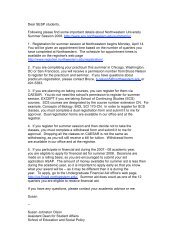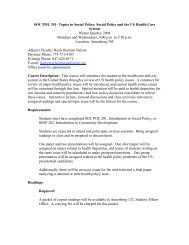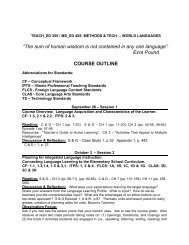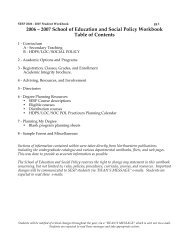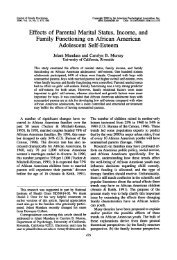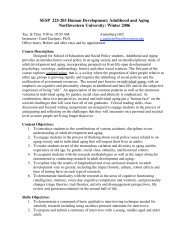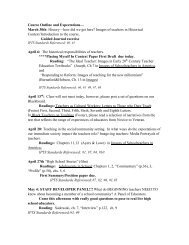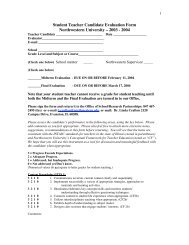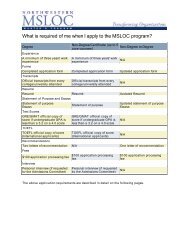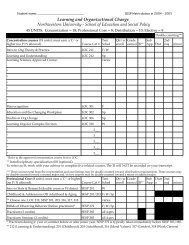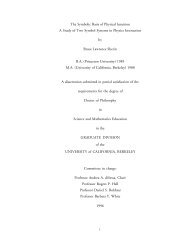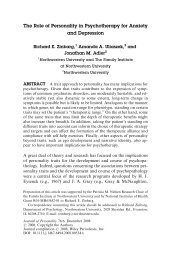Syllabus: Introduction to Counseling Page 1 - Northwestern University
Syllabus: Introduction to Counseling Page 1 - Northwestern University
Syllabus: Introduction to Counseling Page 1 - Northwestern University
You also want an ePaper? Increase the reach of your titles
YUMPU automatically turns print PDFs into web optimized ePapers that Google loves.
<strong>Syllabus</strong>: <strong>Introduction</strong> <strong>to</strong> <strong>Counseling</strong> <strong>Page</strong> 1<br />
James W. Anderson, Ph.D. HDPS 301<br />
122 S. Michigan Ave., Suite 1025 <strong>Northwestern</strong> <strong>University</strong><br />
Chicago, IL 60603-6107 Spring, 2008, Annenberg 345<br />
Tel. (312) 957-0740 Tuesday-Thursday 9:00-10:20<br />
j-anderson3@northwestern.edu<br />
Version B<br />
April 1<br />
<strong>Counseling</strong>: Theory and Practice<br />
<strong>Introduction</strong> <strong>to</strong> the Course<br />
Reading: “Does Therapy Help?” Consumer Reports, 1995.<br />
April 3<br />
Lecture and Discussion: Freud's Psychoanalysis<br />
Reading: Raymond Fancher, “Man in Conflict: The Psychoanalytic Psychology of Sigmund<br />
Freud”<br />
Freud, “Psychoanalysis and Psychiatry”<br />
April 8<br />
Lecture and discussion: Freud's Psychoanalysis<br />
Reading: Freud, "The Question of Lay Analysis," 185-228<br />
April 10<br />
Mini-assignment No. 1 due: A dream<br />
Lecture and Discussion: Freud's Psychoanalysis<br />
Reading: Freud, "Transference"<br />
Freud, "Freud's Psycho-Analytic Procedure"<br />
April 15<br />
Lecture and Discussion: Freud's Psychoanalysis<br />
Reading: Wilczek et al., “Change After Long-Term Psychoanalytic Psychotherapy”<br />
April 17<br />
Lecture and Discussion: Freud's Psychoanalysis<br />
Reading: Anderson, “Freud’s Life and Work”
<strong>Syllabus</strong>: <strong>Introduction</strong> <strong>to</strong> <strong>Counseling</strong> <strong>Page</strong> 2<br />
April 22<br />
Quiz No. 1 in class on “A Case His<strong>to</strong>ry”<br />
Lecture and Discussion: Freud's Psychoanalysis<br />
Reading: Anderson, “A Case His<strong>to</strong>ry”<br />
“Freud Is Not Dead” (Newsweek, March 27, 2006)<br />
April 24<br />
Lecture and Discussion: Rogers’ Person-Centered Therapy<br />
Reading: Betty D. Meador and Carl R. Rogers, "Client-Centered Therapy"<br />
Rogers, “A Client-centered/ Person-centered Approach <strong>to</strong> Therapy”<br />
April 29<br />
Mini-Assignment No. 2 due: the Q-sort<br />
Lecture and Discussion: Rogers’ Person-Centered Therapy<br />
Reading: Rogers, “Ellen West—And Loneliness”<br />
May 1<br />
Videotape of Rogers doing a demonstration therapy session (“Gloria”)<br />
Reading: J. Bozarth, “Research on Psychotherapy Outcome and the Person-Centered Approach”<br />
May 6<br />
Test #1: covering Freud’s psychoanalysis and Rogers’ person-centered therapy<br />
May 8<br />
There will be no class on this date<br />
May 13<br />
Lecture and Discussion: Cognitive Therapy<br />
Reading: Aaron Beck and Marjorie Weishaar, “Cognitive Therapy”<br />
May 15<br />
Mini Assignment No. 3 Due<br />
Lecture and Discussion: Cognitive Therapy<br />
Reading: Steven D. Hollon and Aaron Beck, “Cognitive and Cognitive-Behavioral Therapies,”<br />
pp. 430-435.
<strong>Syllabus</strong>: <strong>Introduction</strong> <strong>to</strong> <strong>Counseling</strong> <strong>Page</strong> 3<br />
May 20<br />
Quiz No. 2 in class on “In Search of the Dreamer”<br />
Lecture and Discussion: Contemporary Psychodynamic Therapy<br />
Reading: Irvin Yalom, “In Search of the Dreamer”<br />
May 22<br />
Lecture and Discussion: Contemporary Psychodynamic Therapy<br />
Reading: Anderson, “The Childhood Adaptational Pattern.”<br />
May 27<br />
Lecture and Discussion: Group Therapy<br />
Reading: Irvin Yalom, The Theory and Practice of Group Psychotherapy, 19-43<br />
May 29<br />
Quiz No. 3 in class on “Can This Marriage Be Saved?”<br />
Lecture and Discussion: Marital Therapy<br />
Reading: Laurie Abraham, “Can This Marriage Be Saved?”<br />
June 3<br />
Lecture and Discussion: Therapy for Drug Abuse and Alcoholism<br />
Reading: <strong>to</strong> be passed out before the class<br />
June 5<br />
Test #2: covering Cognitive Therapy, Contemporary Psychodynamic Therapy, Group Therapy,<br />
Marital Therapy, and Therapy for Drug Abuse and Alcoholism.<br />
Organization of the Course<br />
This course focuses on counseling that is aimed <strong>to</strong> help clients with psychological<br />
problems and difficulties, that is, psychotherapy.<br />
The course begins with an examination of Freud’s psychoanalysis, the original form of<br />
psychotherapy, because, it is argued, the other major forms of psychotherapy are all elaborations<br />
on, or reactions against, psychoanalysis, and they cannot be unders<strong>to</strong>od without a familiarity<br />
with psychoanalysis. Then the three major forms of individual psychotherapy at use <strong>to</strong>day are<br />
studied: person-centered therapy (originally developed by Carl Rogers), cognitive therapy<br />
(originally developed by Aaron Beck), and contemporary psychodynamic therapy. Throughout<br />
the examination of these forms of therapy, attention is paid <strong>to</strong> research on the therapeutic
<strong>Syllabus</strong>: <strong>Introduction</strong> <strong>to</strong> <strong>Counseling</strong> <strong>Page</strong> 4<br />
effectiveness of the different forms of therapy.<br />
Finally, three other types of therapy are studied: group therapy, marital therapy, and<br />
therapy for drug abuse and alcoholism.<br />
There will be two tests spaced during the quarter, each test covering about one-half of the<br />
material. Doing well on the tests requires mastery of portions of the readings and the<br />
information from the lectures.<br />
There are also three mini-assignments related <strong>to</strong> three different forms of therapy, for<br />
example, one assignment involves completing and commenting upon a Q-sort test (a method of<br />
research much used in the person-centered tradition). Please submit hard copies of the<br />
assignments. I will check <strong>to</strong> see that the assignments are done satisfac<strong>to</strong>rily, but I will not hand<br />
them back. Finally, there will be three quizzes in class (see syllabus for the dates and subjects<br />
of the quizzes). The purpose of each quiz is <strong>to</strong> encourage (ok, coerce, if you will) you <strong>to</strong> do that<br />
reading on those days, because we will have a focused discussion on those readings. The quiz<br />
questions will not be difficult; if you have done the reading you should have no trouble passing<br />
the quiz. The assignments and quizzes are graded pass-fail. You cannot make up an F on a quiz.<br />
However, if you miss a class in which there is a quiz, you will receive an F unless you write a 3-<br />
page paper (ask me for the assignment) <strong>to</strong> make up for the quiz you missed.<br />
The goal of the course is for the students <strong>to</strong> learn about the major approaches <strong>to</strong><br />
psychotherapy, the theories on which they are based, the processes and techniques used in<br />
practicing these psychotherapies, and the research on their effectiveness.<br />
Grading<br />
Your grade for the course will be an average of three grades: your grades on the two tests<br />
and your overall grade for the mini-assignments and quizzes. The way that latter grade is<br />
determined is as follows: you receive an A for receiving a pass on all 6 items, a B if there is one<br />
F, a C if there are 2 F’s, and so on.<br />
The tests fulfill the necessary role of providing me with an objective means of evaluating<br />
your performance in the course. I also see them as an integral part of the learning process<br />
because the tests encourage you <strong>to</strong> master the basics of the methods of counseling that we are<br />
studying.<br />
I try <strong>to</strong> make a point of keeping the reading assignments moderate so that I can expect<br />
you <strong>to</strong> study the reading carefully. Through the reading, plus the lectures, you should be able <strong>to</strong><br />
learn each of the methods of therapy that we are studying. The tests will be straight-forward and<br />
fair, covering the information from the readings and lectures. Since the tests rely a great deal on<br />
the lectures, make sure you borrow someone else’s lecture notes if you have <strong>to</strong> miss a class.<br />
(Note: I do not grade on a curve; you will not hurt your grade by helping someone out through<br />
lending your notes.)<br />
The questions on the tests will be short-answer questions. Usually when I ask you <strong>to</strong><br />
define a concept I also ask you <strong>to</strong> provide an illustration (that is, an example).<br />
A typical question might be: “Define Freud's concept of reaction formation and give an
<strong>Syllabus</strong>: <strong>Introduction</strong> <strong>to</strong> <strong>Counseling</strong> <strong>Page</strong> 5<br />
illustration.” Definition: “A defense by which one replaces a threatening impulse or feeling with<br />
its opposite.” An adequate illustration would not be: “A homophobe.” The illustration should<br />
not just be named but should show how the defense operates. For example: "A homophobe is<br />
using reaction formation when he has sexual desire for a gay man, potentially feels threatened by<br />
this impulse, and consciously believes, “‘I hate gay men,’ or ‘I’m disgusted by gay men.’”<br />
If you master the information from the lectures and study the reading, you will do well on<br />
the tests. I will also give you a study “guide” shortly before each test specifying the parts of the<br />
readings that will be emphasized on the tests. But I recommend you do all the reading, because<br />
you will understand the material from the classes (all of which can be asked about on the tests)<br />
much better if you do all the readings). There will be no surprises on the tests. I will simply ask<br />
you a sampling of the major ideas of the course <strong>to</strong> see whether you have learned them. I expect<br />
the great majority of you <strong>to</strong> have a firm grasp of the major methods of psychotherapy by the end<br />
of the course. I have been pleased <strong>to</strong> see in past years that this expectation has been fulfilled. I<br />
hope you enjoy the course and that you feel you have become familiar with a fascinating and<br />
important area of psychology.



